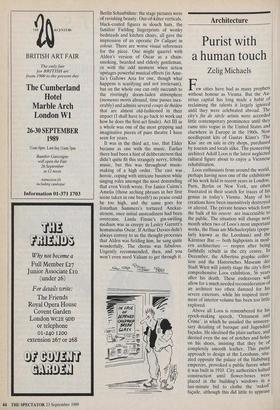ARTS
Opera
Rum goings-on
Rodney Milnes
here are some pretty rum things going on at the Coliseum, and not all of them on stage. Leaving aside for the moment the ENO's demeaning and pointless advertis- ing campaign with its frantically `with-if iconography (as dated as that adjective), there's the little matter of the Great Masked Ball Drama. In the week leading up to the first night of the new production of Verdi's opera by the team of Mark Elder, David Alden and David Fielding that gave us Mazeppa and Simon Boc- canegra, the buzz emanating from St Mar- tin's Lane was that this time the company had Gone Too Far, that there would be demonstrations in the auditorium and fisti- cuffs in the foyers. In the event, the first night last Thursday went rather smoothly: there were the odd boos from the 'Be- mused, Budleigh Saltertons' in the audi- ence, but they were soon drowned by cheers and everyone went home happy as Larry.
It was strange, then, to read on the front page of the Evening Standard the next day
that there had indeed been demos and confrontations between rival fans. No one present to whom I have spoken saw any such thing. It was even stranger to see the same non-story reproduced on the front page of respectable papers like the Tele- graph and the Independent the following Saturday, in one case after the hack concerned had been told that the whole thing was almost certainly pure fabrication. Stranger still was the touching solidarity expressed in these stories by the ENO's managing director, Peter Jonas, with the production team Ca spell-binding evening of intense and enormous power') when it is well known that in early planning stages the idea had been to detach one segment of it (Fielding) and find Alden another desig- ner. It can't be true, of course, but it does look rather as if the ENO is getting into the business of thought-fathering wishes and putting out less than entirely accurate news stories. In which case fellow hacks beware — you have been warned.
But I have no quarrels with Jonas-as- critic: this was indeed a spell-binding even- ing, and by far the, best of the Alden- Fielding shows so far. A Masked Ball is the most deeply mysterious of Verdi's mature operas, one that positively invites an expressionist-surreal presentation. Verdi (and, more significantly, the original libret- tist, Scribe) was writing about historical events that had taken place comparatively shortly before — the assassination of the Swedish King Gustaf III. An analogy today might be Sir Peter Maxwell Davies com- posing an opera in which Stanley Baldwin and the entire Conservative Cabinet sud- denly dress up as sailors and whizz off to Limehouse for a spot of fun while Mrs Baldwin is lurking in Highgate Cemetery in search of unusual herbs to cure her illicit passion for the Prince of Wales. The plot simply doesn't hold water at any level of realism, quite apart from the question of the historical Gustaf s personality (the , widow Anckarstroem, exiled to Paris, sued 1 Scribe for suggesting that she had an affair with someone who was not as other men ' are). So anything goes, I rather think. And it went. Fielding's decor was sim- pler than that for Boccanegra — basically two flats and a pair of hanging pieces — and had the advantage of being quite magically lit by Wolfgang Gabel of the
Berlin Schaubtihne: the stage pictures were of ravishing beauty. Out-of-kilter verticals, black-coated figures in slouch hats, the familiar Fielding fingerprints of wonky bedsteads and kitchen chairs, all gave the impression of an operatic Dr Caligari in colour. There are worse visual references for the piece. One might quarrel with Alden's version of Oscar as a chain- smoking, bearded and elderly gentleman, or with the odd moment when action upstages powerful musical effects (in Ame- lia's Gallows Aria for one, though what happens is scarifying and not irrelevant), but on the whole one can only succumb to the rivetingly doom-laden atmosphere (memento moris abound, time passes inex- orably) and admire several coups de theatre that are almost old-fashioned in their impact (I shall have to go back to work out how he does the first-act finale). Act III as a whole was one of the most gripping and imaginative pieces of pure theatre I have seen for years.
It was in the third act, too, that Elder became as one with the music. Earlier there had been a hint of deliberateness that didn't quite fit this strangely nervy, febrile music, but this was throughout music- making of a high order. The cast was heroic, coping with intricate business while singing roles amongst the most demanding that even Verdi wrote. For Janice Cairns's Amelia (those arching phrases in her first scene taken in one breath!) no praise could be too high, and the same goes for Jonathan Summers's tortured Anckar- stroem, once initial unsteadiness had been overcome. Linda Finnie's
medium was as creepy as Lesley Garrett's homunculus Oscar. If Arthur Davies didn't always convey to us the thought-processes that Alden was fielding him, he sang quite wonderfully. The chorus was fabulous. Urgently recommended, then, and you won't even need Valium to get through it.



























































 Previous page
Previous page